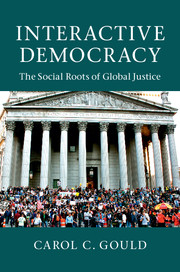Book contents
- Frontmatter
- Dedication
- Contents
- Acknowledgements
- Introduction
- Part I A theoretical framework
- 1 A human rights approach to global justice: elements of theory and practice
- 2 A social ontology of human rights
- 3 Interpreting freedom dynamically: beyond liberty and autonomy to positive freedom
- 4 Is there a human right to democracy?
- Part II The social roots of global justice
- Part III Interactive democracy – transnational, regional, global
- Works cited
- Index
- References
3 - Interpreting freedom dynamically: beyond liberty and autonomy to positive freedom
Published online by Cambridge University Press: 05 September 2014
- Frontmatter
- Dedication
- Contents
- Acknowledgements
- Introduction
- Part I A theoretical framework
- 1 A human rights approach to global justice: elements of theory and practice
- 2 A social ontology of human rights
- 3 Interpreting freedom dynamically: beyond liberty and autonomy to positive freedom
- 4 Is there a human right to democracy?
- Part II The social roots of global justice
- Part III Interactive democracy – transnational, regional, global
- Works cited
- Index
- References
Summary
Introduction
In this chapter, I analyze the concept of positive freedom more fully, retrieving it from critics like Berlin and defending its importance. I indicate how it differs from liberal conceptions of choice and autonomy, and indeed goes beyond even feminist reconceptions of autonomy in more social terms as “relational autonomy.” I want to explicate the ways in which positive freedom is a more open and dynamic conception than traditional understandings of liberty or freedom, and suggest that it is better able to take into account the interdependence of persons. When viewed in an intercultural context, moreover, the proposed understanding of freedom has implications for how we understand universality, and requires a norm of concrete universality.
The first part of this chapter takes off from Isaiah Berlin’s critique of positive liberty, which has resonated through decades of liberal theory. Building on criticisms already advanced by C. B. Macpherson, I first indicate how – contrary to Berlin’s allegations – positive freedom does not in fact entail the mastery of the state or of a collectivity over the individuals within it. I then move to further explicate the conception of positive freedom, understanding it as self-developing or self-transformative activity, in a sense that requires the availability of a set of conditions, material and social. The positive freedom conception also presupposes the important notion of negative liberty, but in an interpretation that includes freedom from oppression, domination, or exploitation, as well as the traditional liberties. Yet, the notion of positive freedom points to the importance of economic and social human rights, in addition to civil and political ones (along with the significance of institutional design for fulfilling these human rights). It also gives rise to rights of democratic participation in a range of joint activities and institutional contexts, as discussed in Chapter 4. I focus here on the comparison of positive freedom with the ideas of autonomy and relational autonomy, and consider the implications of these various interpretations of freedom for the possibility of universal or fully global norms.
- Type
- Chapter
- Information
- Interactive DemocracyThe Social Roots of Global Justice, pp. 58 - 80Publisher: Cambridge University PressPrint publication year: 2014



